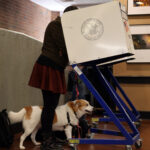Climate Change: An Invisible Issue on the Campaign Trail (Again)
With each year bringing new global temperature records, and with world leaders just a few months removed from a major climate pact, climate change has enjoyed no shortage of headlines lately. Meanwhile, a Gallup poll released this week showed that that the proportion of Americans identifying humans as the primary driver of global warming is at an all-time high, while the percentage of Americans saying they worry about climate change is at its highest point in eight years:
If you thought you’d see all this reflected somewhere on the 2016 presidential campaign trail, you’d be mistaken.
Repeating a pattern that was widely noted in the run-up to the 2012 election, climate change has mostly remained a non-issue in the lengthy roster of debates among both parties’ presidential candidates. Most questions that have mentioned climate this time around have hit the issue obliquely, been targeted at one specific candidate, or didn’t even come from a moderator.
It was only on March 9, during last week’s Democratic debate in Florida, that the first moderator-generated question aimed at sparking an in-depth discussion of climate change was asked. Both Democratic hopefuls — Hillary Clinton and Bernie Sanders — were more than happy to discuss it, and both called it an issue that the government should address.
The Republican candidates also received a question in their Florida debate the following night. But only two of the four candidates — Florida Senator Marco Rubio and Ohio Governor John Kasich — had the chance to respond, with only Kasich expressing openness to climate policies.
The reaction on social media said it all. “We just had more content on climate,” quipped Jamie Henn of the climate advocacy group 350.org after the Democratic debate, “than [in] all the other debates combined.”
Why this trend continues is difficult to pin down. While the Gallup numbers suggest rising concern, other polls, probing the climate question as set against other global problems, reveal a more nuanced picture. Consider an early 2016 YouGov poll, which found that just 9.2 percent of Americans identify climate change as their top issue of concern (the largest share — 28 percent — ranked global terrorism as their top worry).
Political partisanship aside, the climate problem remains abstract and distant for many people — both in terms of geography and time. As Ed Maibach of George Mason University and colleagues have noted, a growing body of research suggests that this “psychological distance” is an often overlooked reason for continuing delays in government action.
In another recent analysis of the literature on climate attitudes, Rachel McDonald, a social psychologist at the University of Kansas, reinforced the growing idea that communication strategies need tailoring in order to target the values, ideologies and norms of different groups of people. Some efforts at communicating climate impacts, McDonald and her co-authors also noted, might provoke such strong emotional responses that they trigger avoidance rather than concern.
In the end, it seems, few things focus the mind like personal experience. A study last year in the journal Global Environmental Change, for example, found that having personal experiences with climate change — along with an abiding belief that personal actions, like carpooling and weatherizing homes, really matter — can often boost support for political measures aimed at addressing the problem.
Gallup’s own pollsters speculated that concern over the issue might be rising in part due to a series of unusually warm winters over the preceding decade.
“If that’s true,” the Gallup researchers noted, “continuation of such weather patterns would likely do more than anything politicians and even climate-change scientists can to further raise public concern.”










